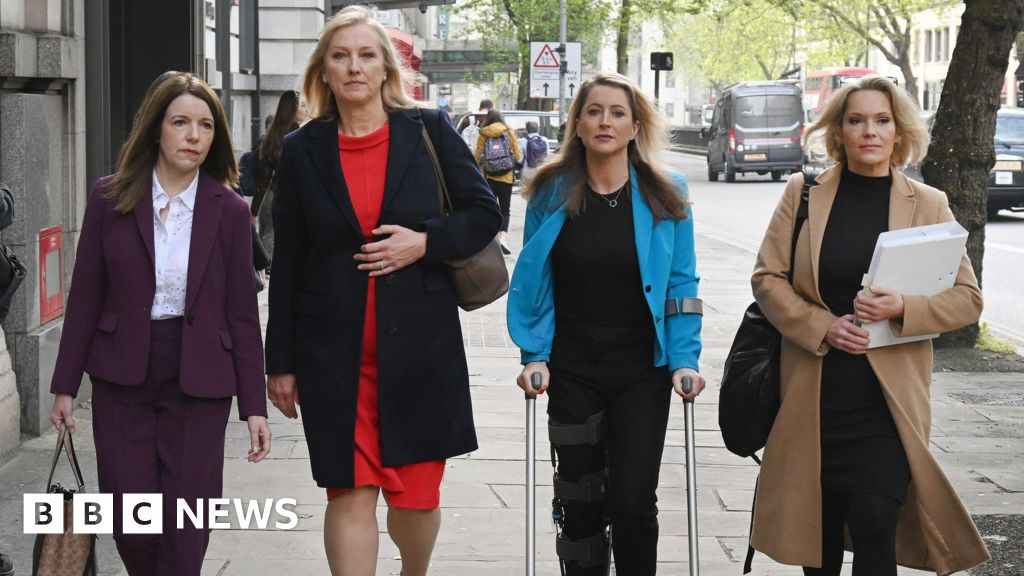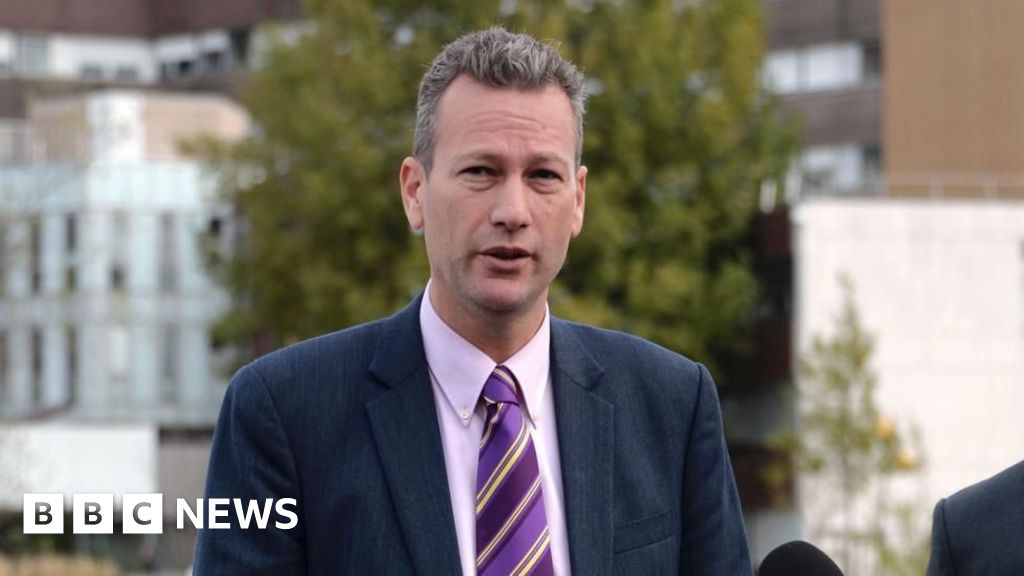 Image source, Hugh Stanley
Image source, Hugh Stanley
Linn Johansson and Matthew Johnson suffered health problems when their landlord failed to make repairs
By Tim Dodd
BBC News, England
By the time Linn Johansson's landlord finally came to inspect a leak in her flat, the resulting water damage and black mould was making her ill.
Evidence of the leak had first appeared on the bathroom ceiling and walls of the home in south London about two months after she and her husband Matthew Johnson moved in.
The couple developed allergic reactions, such as sneezing and heavy breathing, but their landlord told them to just wipe the mould off.
Promises to inspect the fault came and went over a year, Linn says, and the landlord eventually agreed to come and make repairs when the water started showing up again.
But only two hours after this promise, Linn says the landlord texted to say: "On second thought, I want you to move out."
When he came to visit the flat in December, Linn says the landlord finished the conversation by handing them an eviction notice and wishing them a "Merry Christmas".
Image source, Linn Johansson
Image caption,Left to right: Fuzzy mould in the bathroom, flaking flooring due to a leak and water damage on the ceiling
Given Linn and Matthew are just one of the 4.6 million households in England who privately rent, Linn says it is "insane" that new legislation to force landlords to fix hazards - such as damp and mould - within certain timeframes will not apply to them.
The planned legislation, which would be an amendment to the Social Housing Regulation Bill, only applies to the social rented sector.
The legal changes, which the government has been consulting on, would force social landlords in England to investigate issues within two weeks and begin repairs within a further seven days.
Emergency work would have to be carried out within 24 hours.
Image source, Linn Johansson
Image caption,Linn and Matthew later found out they were evicted because the landlord wanted to sell the flat
"How can you have a law that's about health and hazards that only applies in certain circumstances?" Linn says.
"It's just baffling... that it actually just comes down to money. If you have money, you can buy a well-built property where you won't have any mould issues. If you don't have money, you just have to take whatever you can get."
To make matters worse, when Linn, 35, and Matthew, 33, received their eviction notice, they were grieving a recent miscarriage.
They wanted to try and conceive again, but Linn was anxious about the mould in the flat. "Do we dare trying for a baby? How could this affect a pregnancy?" she worried.
The couple believe their landlord evicted them so he could raise the rent, as they had already made it clear they would struggle to pay any more.
"I had my first experience of panic attacks because I didn't know where we were going to move to," Linn says.
In recent months, MPs have called for Awaab's Law to apply to the private rented sector where there are more homes in a dangerous condition.
The House of Commons' Health and Social Care Committee found an estimated 0.2% of properties in the social rented sector have a damp or mould hazard rated at category one - the most dangerous level.
But in the private rented sector, the figure is about 3.6% of properties.
Committee chairman Steve Brine MP said all tenants "deserved protection" but the government had "dragged its feet" in updating the existing decent homes standard for social housing and extending it to private rentals.
The government says new standards for the private rented sector and a new ombudsman are contained in its Renters (Reform) Bill, which is working its way through Parliament.
'I got locked in my bedroom'
Image source, Daniel Keeler
Image caption,Rose Keeler-Schäffeler and her fiance Daniel experienced a number of issues at their last flat in London
An ombudsman with the power to enforce such standards might have helped Rose Keeler-Schäffeler and her fiance Daniel who found the bathroom sink was leaking when they moved into their flat in south London in 2022.
"I said [to the landlord], 'Oh, the sink's leaking, that's gonna need repair', and she said, 'Oh no, it'll cost too much, so just stick a bucket underneath it'," Daniel says.
Drainage issues are one of the 29 health and safety hazards that Awaab's Law should address. The couple say it took about seven months for the leak to be repaired.
When they asked the landlord if they should report their issues to their letting agency, Purple Bricks, the landlord told them not to.
She told the couple the company was "useless and expensive" and asked them to contact one of her handymen.
Image source, Rose Keeler-Schäffeler
Image caption,The landlord told Rose and Daniel she was being bothered with maintenance requests while "in rural Morocco with no wi-fi"
Other issues faced by the couple included a broken shower, washing machine and lights, and black mould. But the most acute danger came when Rose got locked in her bedroom.
"When we moved in we noticed the doors kind of stuck when you were opening and closing them, and then the handles were coming off, so you had to keep screwing those back on," Rose says.
"I was in there with my partner's son, and then that's when the door handle came off.
"There was just no way I was going to get out there."
After being stuck for about an hour, Daniel arrived to bash the door in from the other side and release her.
The hazards of entrapment and fire are both in the list that Awaab's Law should tackle in the social-rented sector.
"I would have hoped that they would apply it to all [rental] sectors," Rose says.
"Because the mould thing especially was quite a big thing, because my partner's son has asthma, and he was ill every month when we lived in that house."
Black mould was a frequent occurrence in the flat, say the couple
A further complication for private renters raising complaints about housing standards is the ability of landlords to issue a Section 21 or no-fault eviction notice to remove tenants without reason.
Polly Neate, chief executive of housing charity Shelter, said every landlord should have clear timelines for dealing with disrepair and tough action should be taken where they fall short.
"But before Awaab's Law can be successfully applied to private renting, no-fault evictions must be scrapped, otherwise tenants will still be too afraid to complain in case they are kicked out," she said.
"Worryingly, the new legislation - the Renters (Reform) Bill - that's meant to ban no-fault evictions and drive up rental standards is under threat right now from a small minority of MPs, many of them landlords, who want to water it down or kill it off to suit their own interests."
When the bill was debated in the House of Commons again on Wednesday, MPs voted in favour of an indefinite delay to ending Section 21 notices while the effects of a new tenancy system on the county courts are assessed.
However, it still includes new provisions for enforceable standards in the private rented sector like those that have applied in the social rented sector since the early 2000s.
A Department for Levelling Up, Housing, and Communities spokesperson said: "No tenant should have to live in dangerous housing conditions, and our Renters (Reform) Bill will introduce a decent homes standard for privately rented homes for the first time.
"This will give councils new powers to immediately fine landlords up to £5,000 if they let out homes that are dangerously unsafe.
"Alongside this, the bill will abolish Section 21 evictions and create a new ombudsman to empower tenants to challenge landlords who fail to address legitimate complaints."

 10 months ago
52
10 months ago
52









